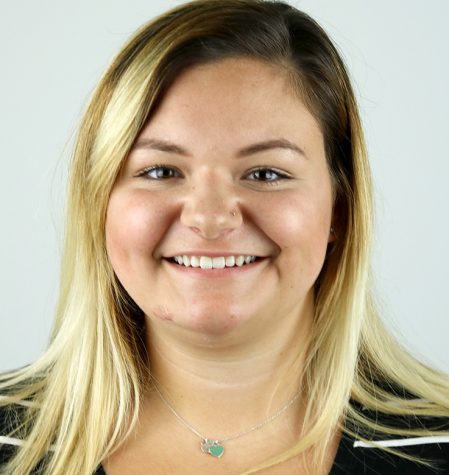Faculty forum talks Eastern’s future
Committee members discuss how to make Eastern stand out among other Illinois universities
September 12, 2019
Higher education is constantly changing, and the Faculty Senate is figuring out how Eastern can keep up competitively.
Michael Dobbs, a professor in the school of business, presented the information he gathered about Illinois institutions Thursday afternoon at the faculty forum.
Teshome Abebe, chair of the faculty forum committee, led the forum by explaining the reason for the presentation—to discover and determine the future for higher education.
“One implication in my view is that we have to thoroughly assess our purpose and review or counterbalance our priorities because purpose without priorities renders us powerless,” Abebe said.
He said higher education is being impacted globally because of constant changing trends that present both challenges and opportunities.
The opportunities, though, only appear for those who understand the changes and can figure out how to implement them positively into their institutions, Abebe said.
Eastern President David Glassman said the topic of the forum arrived at the perfect time.
“It’s extremely timely, it’s very important (and) it does affect the very sustainability of our institution and other institutions like ourselves across the country,” Glassman said. “Higher education is a changing phenomenon right now. We used to talk about how it took forever to change higher education or to make change in a university, but that’s no longer the playing field.”
Certain changes include students gaining the ability to receive in-state tuition prices despite not necessarily living in the state of the university they choose.
With financial aid becoming more accessible and new technology offering education to students at a discounted price, Glassman asked, “How do we remain relevant in this changing universe that we exist in?”
Dobbs’ presentation showed that Eastern has four key players the University interacts with: suppliers, buyers, competitors and complementers.
The suppliers provide Eastern with a list of services, such as the faculty and staff payroll and benefits, physical university operations and technology resources, all for a cost.
The buyers act as a source of revenue, and they include donations, state appropriations, auxiliary service fees or earnings, grants, contracts and tuition.
Dobbs pointed out that while tuition is a source of revenue, it is not always paid by the students; sometimes tuition is paid by students’ parents, federal grants or scholarships.
He said Eastern’s competitors are all of the other Illinois public universities, private institutions, the new online education options, community colleges that offer four-year degrees and the military.
The complementers, which enhance the flows between the buyers or suppliers and the institution, consist of value-producing, transaction and value perception.
The value-producing comes from the Charleston community and alumni network while transaction complementers include the banks and transportation infrastructure.
Value perception complementers are those who are able to change the value of the perception of the buyers.
Dobbs’ presentation provided the information the “decision makers” need to help keep Eastern relevant and in the competition for future students.
The decision makers Dobbs spoke of are members of the think tank, an idea that was proposed in the fall of 2017 and is still in the process of being finalized.
The think tank’s purpose is to focus on the macro trends taking place in higher education.
Abebe said the think tank group has not been completely populated yet, although the faculty senate has appointed three members.
“We haven’t met yet; we are waiting for (Glassman) to appoint certain administrative members on the committee,” Abebe said.
Hannah Shillo can be reached at 581-2812 or at hlshillo@eiu.edu.




































































